Our diet is sweeter than ever. In fact, 75 percent of foods and beverages bought in the United States contain added sugars.
75%!!!!
The evidence against sugar is strong–it being a major contributor to heart disease, diabetes, cancer, and more.
Still, the average American consumes 17 teaspoons of sugar every day. Hello, sweet tooth.
But, what about the other sweeteners? The “zero-calorie,” “low glycemic,” “unrefined,” “better-than-sugar” alternatives?
Natural Sweeteners
White Sugar
Fruit
Dates
Raw Honey
Stevia
Monk Fruit (Luo Han Guo)
Yacon
Coconut Sugar
Maple Syrup
Sugar Alcohols
Sweetamine
Kakato
Artificial Sweeteners
High-Intensity/Non-Caloric Sweeteners
Are there ways to enjoy some sweetening without the side effects of sugar? Let’s break it all down–from stevia to sucralose– so you can decide which sweeteners or sugar substitutes, if any, are right for you.
Wait!
Before we dive in, there’s something you need to know: if you have health concerns, the best sweeteners are NO sweeteners at all.
They all stress your system in some way. Worse, they keep your palate acclimated to sugary sweetness, perpetuating cravings and making it harder to enjoy foods that can help you heal.
For deep healing, try a sugar detox to reset your system (and palate), then skip sweeteners for a while.
Natural Sweeteners
White Sugar (Refined Sugar, Table Sugar, or “Sugar”)
At 100% pure sucrose, regular sugar is as harmful as it is prevalent.
It has no nutritional value (3) and a crazy high glycemic index (65), which spikes blood sugar and signals the body to store fat.
That’s just the start. Sugar is highly inflammatory and upsets the delicate balance of bacteria in the gut, affecting metabolism and immune system function (4).
It also disrupts hormones, especially leptin, ghrelin, and serotonin—key appetite and mood regulators. This causes an addictive cycle of hunger, fatigue, and moodiness.
Bottom line: 100% pure sucrose is 100% harmful and should be avoided as much as possible.
Side note: brown sugar is basically white sugar, either mixed with molasses or slightly less refined. Its nominal amount of nutrients is hardly worth mentioning and doesn’t make brown sugar any healthier than white.
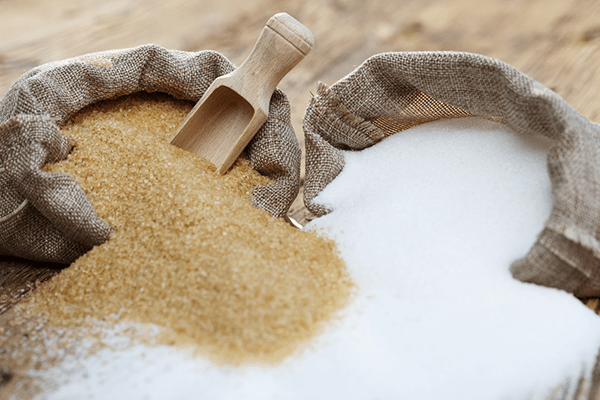
Fruit
“Fruit makes you fat!” It’s oversimplified slander like this that fuels unnecessary fruit fears.
True, fruit contains natural sugars which can contribute to weight gain if consumed in excess. But, let’s be real, fruit is not the reason we have an obesity and chronic illness epidemic.
In fact, in one of the largest surveys of data on diet-related deaths, 2 million diet-related deaths were attributed to not eating enough fruit (5).
Fruit is high in disease-fighting antioxidants, immune-boosting nutrients like vitamin C, and gut-friendly dietary fiber. Fiber actually slows down the release of sugar into the bloodstream so your body is more likely to burn it as fuel, rather than store it as fat.
Bottom line: Fruit contains antioxidants, essential vitamins, and minerals. Unless you are diabetic, or showing signs of insulin resistance, you don’t need to fear fruit and can enjoy it as a healthful, natural dessert.
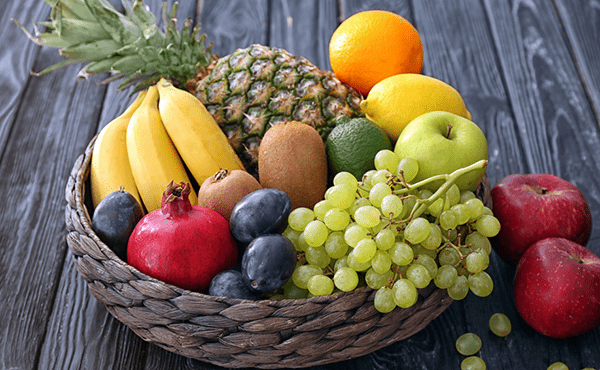
Dates
Super sweet and delightfully chewy, this dried fruit of the date palm tree is loaded with vitamins, minerals, and fiber. Evidence shows dates may help lower LDL (“bad”) cholesterol, triglycerides, and oxidative stress (6,7).
For a sweetener, you can make date paste or syrup by soaking dates in hot water and blending them to the desired consistency. This serves as a great, nutrient-dense sweetener for baked goods.
Bottom Line: Dates are high in natural sugar but also high in health-promoting nutrients and minerals. They can withstand heat, making date paste a great sweetener for baking.
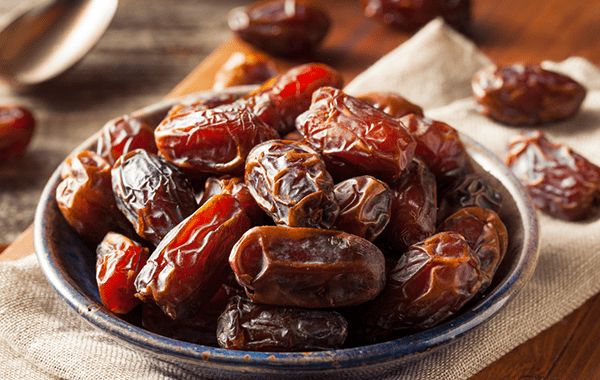
Raw Honey
Did you know honey was once used for its medicinal value? Yep, honey is medicine.
Loaded with antioxidants, enzymes, and health-boosting vitamins and minerals like iron, zinc, potassium and vitamin B6, raw honey is a great prebiotic for those helpful gut bacteria. It is also antimicrobial and can help with seasonal allergies.
Once honey is pasteurized or heated (like most of the stuff on supermarket shelves) it loses its superfood properties. So be sure to get raw honey and don’t cook with it, either.
Honey is extremely sweet, with a high glycemic index (50), so use it sparingly as a finishing sweetener: drizzle it on yogurt, add it to salad dressings, and stir it into your slightly cooled morning tea or coffee.
Bottom line: Raw honey is the only sweetener that is also a superfood. Enjoy it in moderation, but skip it if you have high blood sugar, want to lose weight, or are fasting.
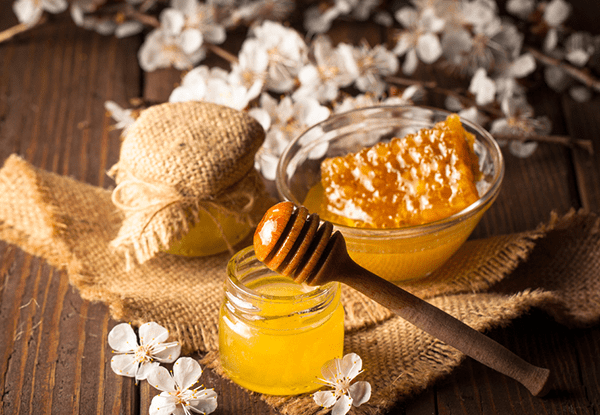
Stevia
The “healthy” sweetener-du-jour.
Stevia is naturally-derived, calorie-free, and often found in protein powders, soft drinks, and all things paleo or keto.
But, is it really all it’s hyped up to be?
Stevia has a glycemic index of 0, so it doesn’t raise blood sugar, but there is evidence that it raises insulin levels. Studies also conflict on how it affects gut health: some show no impact on the microbiome while others show it disrupts the balance of health-promoting microbes (8,9).
Most of what we consume is stevia extract, not pure stevia leaf. This “natural” extract is so chemically altered and refined, it hardly resembles anything found in nature.
Bottom line: The commercial production and use of stevia is relatively new and studies are limited and conflicting. Proceed with caution and listen to your body to decide if this sweetener is right for you. If so, use pure stevia leaf (whole leaves or powder) and avoid ultra-refined stevia extracts.
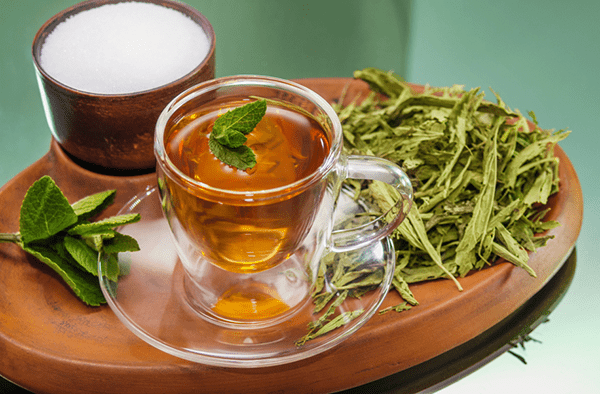
Monk Fruit (Luo Han Guo)
The newcomer to the sweetener scene, monk fruit may displace stevia as the favorite natural, non caloric sweetener.
An actual fruit–a melon–from southeast Asia, it has been cultivated for centuries and used for its super sweet taste.
What makes monk fruit unique from other fruits is that its sweetness comes from mogrosides, not fructose. Mogrosides are not metabolized the same way as other sugars, which is why monk fruit has no effect on blood sugar.
It also has anti-inflammatory, antihistamine, and anti-fatigue properties.
Bottom line: Monk fruit is a new player in the sweetener game, but it seems to be a winner. It adds natural sweetness without the harmful blood sugar and inflammatory effects of sugar. But, proceed with caution if you are diabetic/insulin resistant or fasting as preliminary studies show that it does still trigger insulin production (10).
A word of caution: Due to its potency, monk fruit is often laced with corn-derived dextrose or even white sugar. Read the packaging carefully and get the pure, unadulterated stuff.
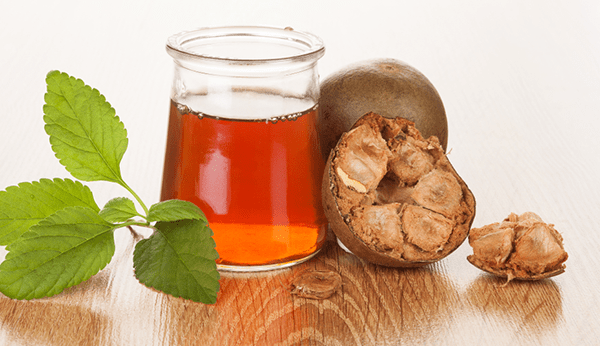
Yacon
Yacon is a root vegetable from South America. Aztec communities have used it for centuries for its prebiotic, antidiabetic, antioxidative, and antimicrobial properties (11).
Much like maple syrup, yacon is made into a syrup by extracting the juice and then filtering and evaporating the liquid.
What makes it such a great sweetener is its high concentration of fructooligosaccharides (FOS), a type of soluble dietary fiber and prebiotic. FOS is especially beneficial to bifidobacteria and lactobacilli, both important for gut health and immune function (12,13). FOS may also improve insulin resistance, the precursor to many chronic diseases (14).
Yacon syrup does contain a small amount of sugar (fructose, glucose, and sucrose) which will affect blood sugar and should thus be avoided during fasting.
Bottom Line: An extremely low glycemic index (1) and high fructooligosaccharide (fiber) content make yacon syrup a good sweetener for promoting weight loss and managing insulin resistance/type 2 diabetes (15). The fructooligosaccharides can start to break down at high temperatures, so don’t use it for cooking (16).
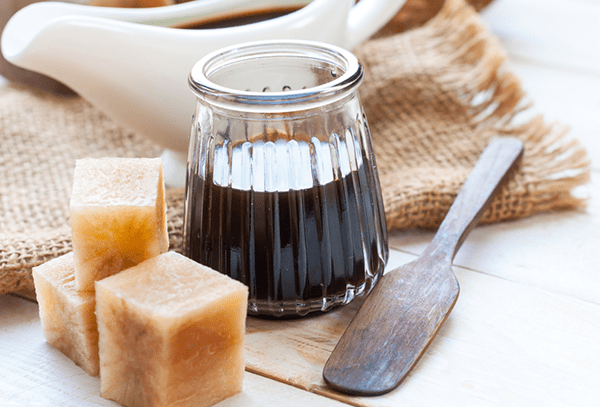
Coconut Sugar
This paleo-friendly sugar has gained popularity and offers some unique health benefits.
Coconut sugar contains trace amounts of vitamins, minerals, and phytonutrients, but is mostly revered for its probiotic effects: it contains inulin, a type of fiber which promotes the growth of gut-friendly bifidobacteria (17).
Inulin may also reduce the absorption of glucose, which helps keep blood sugar stable and is thus safer for diabetics (18).
Bottom line: Coconut sugar tastes similar to brown sugar, but has a lower glycemic index (35) and the added benefit of gut-friendly, glucose-moderating inulin. It can usually be used in place of white or brown sugar, and is certainly a better option. Like any sweetener, it should be used sparingly.
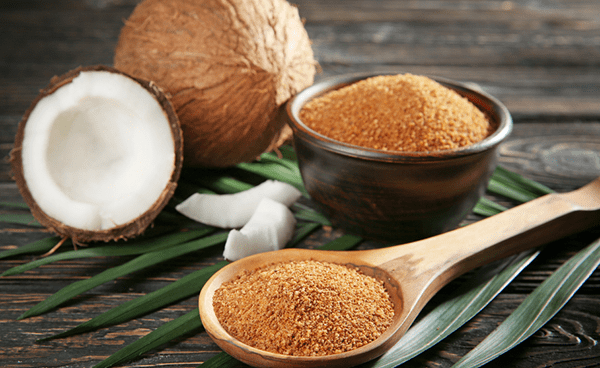
Maple Syrup
What makes maple syrup unique is its high antioxidant content–specifically its 24 different phenolic compounds (19).
These compounds have powerful anti-aging and disease-fighting properties. They combat free radicals and oxidative stress, which is attributed to inflammation and a number of diseases, including cancer, dementia, autoimmune disorders (20).
Bottom line: With a glycemic index of 54, maple syrup is high in sugar but its high antioxidant content likely counters the harmful effects of the sugar (21).
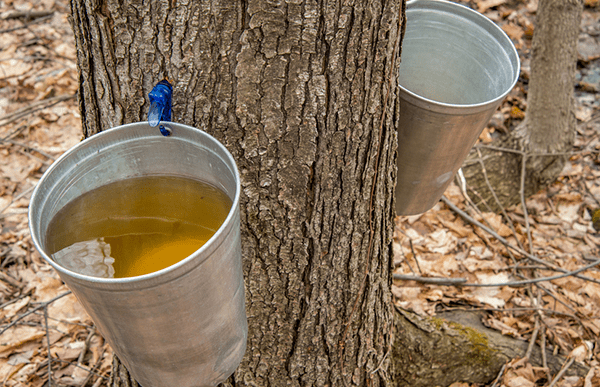
Sugar Alcohols
Present in plant sources, sugar alcohols are extracted, concentrated, and chemically altered for commercial use through a complex refining process (22). They are often found in chewing gum, “sugar-free” candies, and other processed foods. Xylitol, erythritol and sorbitol are a few examples.
These sugar alcohols are actually neither sugar nor alcohol. They are a type of FODMAP, which is a short-chain carbohydrate that is poorly absorbed in the small intestine. They get fermented by bacteria in the large intestine, which can cause some unpleasant gastrointestinal symptoms: bloating, diarrhea, and flatulence… oh my! (23)
This can create a feeding ground for unwanted bacteria and pathogens and disrupt the gut microbiome.
Sugar alcohols don’t raise blood sugar or insulin levels the same way sugar does, making them popular in the keto community (the keto-friendly sweetener, Swerve, is predominantly erythritol).
Bottom line: Sugar alcohols are highly refined, largely indigestible, and can cause GI upset and imbalances.
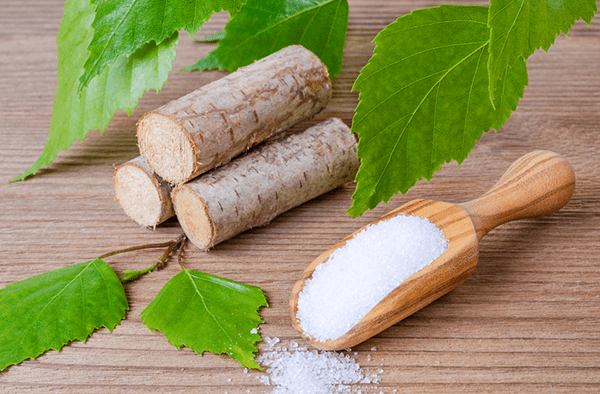
Sweetamine
This is actually a glycine supplement that is mixed with stevia to function as a sweetener. Glycine is an important amino acid that your body uses to make protein and regulate inflammation and oxidation, among other things (24).
Bottom line: Refer to the section about stevia to determine if it is the right sweetener for your health goals. If so, Sweetamine may be a great way to sweeten your morning coffee while getting a high dose of anti-inflammatory glycine.
Kakato
This high-fiber sweetener is a blend of soluble fiber (Isomalto-Oligosaccharides) and three natural, non caloric sweeteners (tagatose, stevia, and monk fruit).
What is tagatose, you ask? A very sweet, low glycemic, low calorie sweetener produced from milk sugar (lactose) (25). It doesn’t raise blood sugar levels and is metabolized by the liver and in the colon (26). In high doses, it can cause some undesired gastrointestinal effects (27).
The main concern is that the liver metabolizes tagatose the same way it does fructose: by converting it to glycogen, or stored sugar. The body can only store about 600 grams of glycogen, so any additional sugar intake is converted into fat.
Bottom line: The prebiotic fiber in Kakato offers gut health benefits, but the blend of sweeteners, particularly tagatose, does raise some concerns. You might be better off selecting the individual sweetener that suits your needs and relying on whole food sources of prebiotics, like onions and under-ripe bananas.
Artificial Sweeteners
High-Intensity/Non Caloric Sweeteners
These emerged in the 1950’s with diet sodas and gained popularity through the 1970’s during the rise of calorie-counting diets.
There are 6 FDA approved artificial sweeteners: aspartame, saccharin, ace-K, sucralose, neotame, advantame. You probably know their street names: Equal, Sweet ‘N Low, and Splenda, to name a few.
Calorie-free and up to 600 times sweeter than sugar, artificial sweeteners may seem almost too good to be true. And, it turns out, they are.
- They increase your risk of type 2 diabetes.
They don’t affect blood sugar but they do still trigger the release of insulin. Daily consumption of diet drinks is associated with a 36% greater risk for metabolic syndrome and a 67% increased risk for type 2 diabetes (28).
- They promote weight gain.
One 7-year study showed the risk of long-term weight gain and obesity is significantly greater for those who consume artificially sweetened beverages (29).
- They are addictive.
Intense sweetness lights up the reward center in our brains, causing us to crave more. It may even be more addictive than cocaine. In studies of rats who were exposed to cocaine and then given a choice of cocaine or saccharin, 94% chose saccharin (30).
Bottom line: These “guilt-free” sweeteners may actually be worse than sugar. They can increase your risk of weight gain, metabolic syndrome, type 2 diabetes, and cardiovascular disease (31). Steer clear.
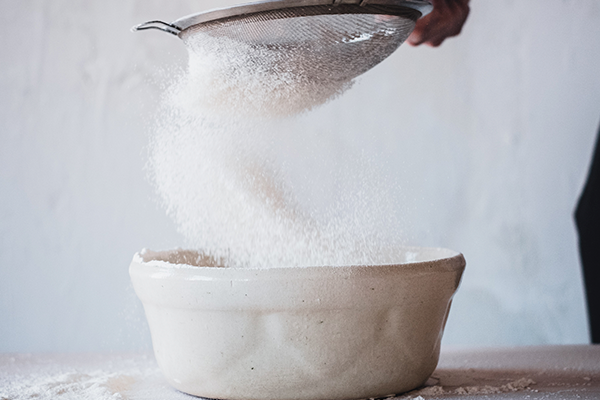

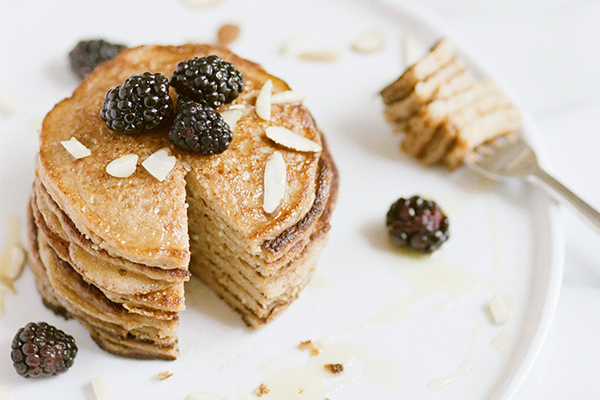
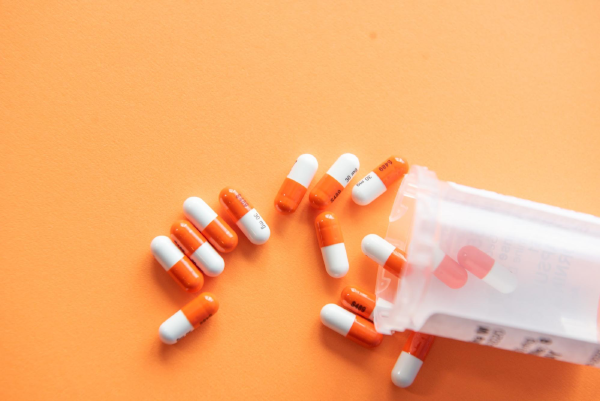
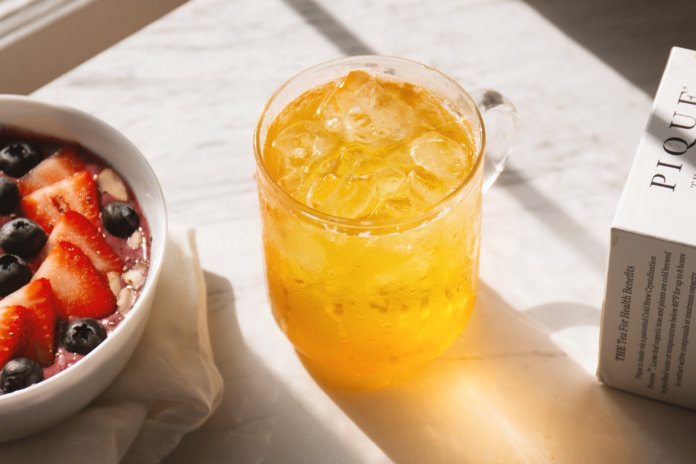
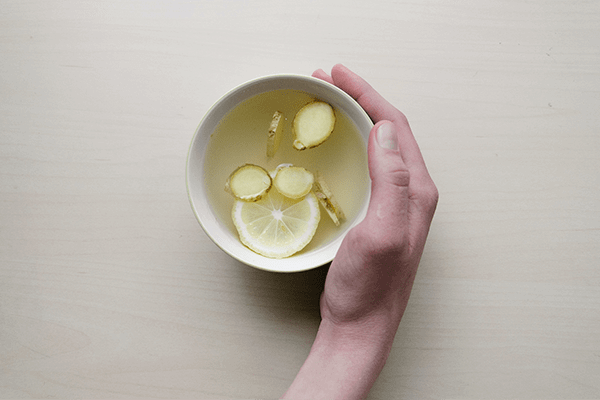
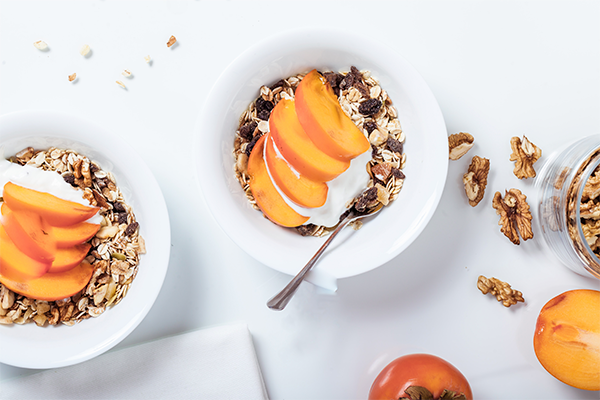
Good article. I enjoy a bit of raw manuka honey in my hot black tea. What do you think of Agave Necter? I’ve heard mixed reveiws on it.
I use Swerve exclusively. It is the only no-sugar sweetener that leaves no aftertaste in my mouth. But I use it sparingly.